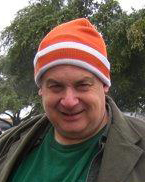Tuning Up Climate Models: Climate models have a hard time depicting clouds and extreme rainfall events. Michael Tobis gets under the hood to tune up the models
September 8, 2007

Michael Tobis joined the Institute for Geophysics as a research scientist associate in May 2007 working in the climate research section designing, implementing, and managing software projects.
His interests include earth system modeling, and most of his work uses the National Center for Atmospheric Research’s Community Climate System Model. He is currently working with Charles Jackson, a research scientist at the Institute studying the confidence limits of climate models and seeking ways to improve their fidelity.
“The ongoing experiment is about free parameters in the way clouds are described within the model,” Tobis said. “The tradition is to measure things as best you can, and then if it doesn’t work there is an ad hoc tuning process to make the model work a little better. But we go back to the data to find objective ways to improve the values of the underlying parameters.”
By repeatedly running the climate models, then analyzing the results and making adjustments, Tobis refines their performance–sometimes in unexpected ways.
“Climate models have not been very effective at capturing extreme rainfall events,” he said. “We tuned the model to get other things right and the extreme rainfall events improved dramatically. It took us by surprise, but it gave us confidence that our work is producing something real.”
Tobis earned his Ph.D. in atmospheric and oceanic sciences at the University of Wisconsin in 1996, and he also holds a master’s degree in systems and computer engineering from Carleton University.
For more information about the Jackson School contact J.B. Bird at jbird@jsg.utexas.edu, 512-232-9623.
